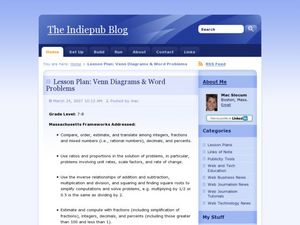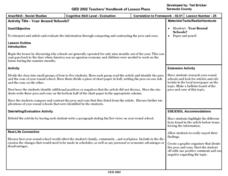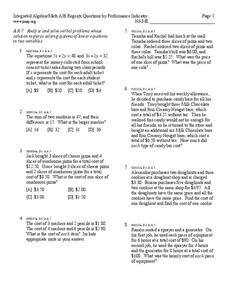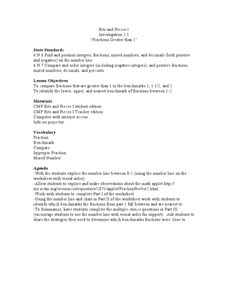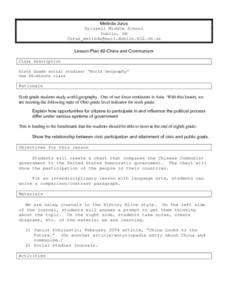National Energy Education Development Project
Introduction to Solar Energy
People have been using solar energy for many generations to dry crops, heat homes, and for light. This presentation explains how now it is possible to capture the solar energy and store it for future use, details how and where people use...
CK-12 Foundation
Properties of Rational Numbers: Lollipop Trees
A six-question interactive takes mathematicians to Lollipop Land where they manipulate lollipop trees to make equivalent ratios. Question types include multiple-choice, true or false, and a discussion.
Curated OER
Finding Smallest Numbers in Sets
For this smallest numbers worksheet, learners circle the smallest number in a set which includes both negative and positive integers, 20 sets total. An answer key is included.
Curated OER
Venn Diagrams & Word Problems
Students explore the concept of Venn Diagrams through word problems. In this Venn Diagram lesson, students solve word problems about groups of people using Venn Diagrams. Students use survey results about MySpace and Facebook in a Venn...
Curated OER
Year Round Schools?
Young scholars explore reasons for the length of the school year in the United States. The pros and cons for extensions of the year are researched and discussed.
Curated OER
Linear Equations
In this algebra activity, students solve linear equations and graph their answer. They add and subtract integers and compare them using a number line. There are 15 questions with an answer key.
Curated OER
Number and Number Relations: Lesson 3
Eighth graders compare whole numbers and decimals. They use symbols for <, >, =, and order whole numbers and decimals. They practice the meaning of positive and nugative integers by using them to describe real-world situations.
Curated OER
Bits and Pieces: Fractions Greater Than One
Students compare fractions. In this fraction worksheet, students examine the number line. Using the Internet, they explore models of numbers greater than one. Students complete multiple-choice worksheets.
Curated OER
Saving Money Through Mathematics
Third graders discuss light sources and collect data about energy sources. They compare data and create a multiple line graph showing energy used by light sources for each student in the group. They present their graphs and write a...
Curated OER
Differentiate Elements, Compounds, and Mixtures
Students examine the differences between elements, compounds and mixtures. Using diagrams, they compare and contrast atoms and molecules and describe various chemical reactions. They distinguish the differences between ionic and...
Curated OER
Meter Marker Mania
Students identify integers as rational and irrational numbers. In this algebra lesson, students measure and construct number lines using positive and negative integers. They convert between decimals and fractions.
Curated OER
Outbreak!
Eleventh graders explore the spread of a disease through a population. In this Algebra II lesson, 11th graders analyze graphical data representing they spread of a disease. Students produce a graph of the virus data, analyze the data,...
Curated OER
Decimals Anyone?
Seventh graders compare and order decimals. Given a set of integers, they compare them using inequalities. In groups, 7th graders participate in hands-on decimal activities. Using string, paper clips and decimal cards, classmates...
Curated OER
The Price Is Right - Grocery Store Prices
Eighth graders use the unit price to compare which local grocery store has the best prices. Assign students to work with a partner and a role. One person is the recorder and the other is the mathematician.
Curated OER
Get In Line!
High schoolers compare and order fractions and decimals using a number line. They use rules of conversion to determine equivalencies competing problems accurately and plot points on the number line that represent the correct order of the...
Curated OER
Ordering Numbers
Seventh graders compare and contrast positive and negative numbers. They create a T-Chart and list real word examples of positive an negative numbers. After observing an number line and a football field, 7th graders describe the...
Curated OER
Approximate Solution to an Equation
Students solve equations through trial and error. In this algebra lesson, students first estimate their answers and then calculate it to check their work. They solve problems involving roots and integers.
Curated OER
Democracies in North America: Canada, the United States, and Mexico
Pupils examine democratic values. In this democracy activity, students research the political systems of Canada, Mexico, and the United States in order to compare and contrast them. Pupils also discuss domestic and international events...
Curated OER
China and Communism
Sixth graders discuss what might happen if United States government took over media ownership, read Junior Scholastic article entitled "China Looks to the Future," and create chart comparing Chinese Communist government to United States...
Curated OER
Will There be Enough Water?
Students investigate water usage, water available, and water demand historically in the local area. They use projections of water usage, availability and demand up to the year 2050. Students use graphs to relate as well as compare and...
Curated OER
Surface Meteorological Observation System (SMOS)
Learners investigate local surface weather conditions. They log weather conditions for thirty days, develop a graph, plot cloud cover, and compare/contrast the graphed lines of various weather factors.
Curated OER
Convolution
In this circular convolutions worksheet, students solve 8 different problems that are related to circular convolutions. They let g be defined by an arbitrary vector and determine the formula for 8 samples for f and g. Then, students find...
Curated OER
Averages
In this averages worksheet, 6th graders solve and complete 3 various types of problems. First, they find the mean, mode, median and range for each set of data shown. Then, students match each team to the picture shown that they think...
Curated OER
A Togolese Tale: The Big Fire
Young scholars read a Tonolese folktale and outline the elements of the story. In groups, they discuss the various morals presented in the story and if they are unique to the Tonolese culture. To end the lesson, they identify the...





